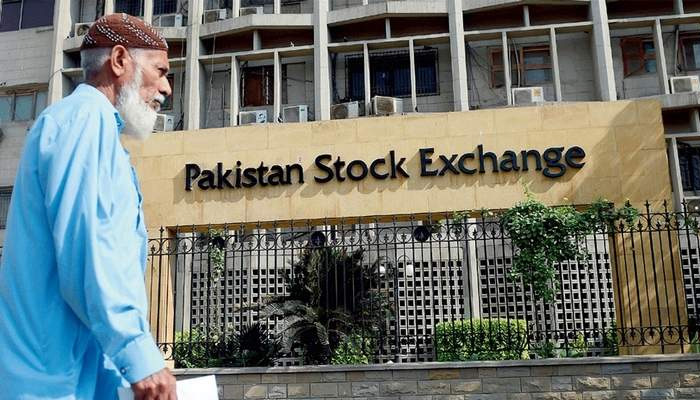Stock market almost doubles in five years of Nawaz govt: analysts
KARACHI: Stock market almost doubled during the five years tenor of Pakistan Muslim League (Nawaz) government as economic indicators showed resilience; although frequent political turmoil took its toll on the equity performance, analysts said on Wednesday.
Equity analysts expect the new government to lure investors towards the capital market by providing incentives and ensuring a ‘level-playing’ field vis-à-vis real estate sector or other investment avenues.
Zeeshan Afzal, head of research at Insight Securities said the KSE 100-share Index of Pakistan Stock Exchange (PSX) climbed 97.4 percent to 42,622 points in May 2018 from 21,590 points in May 2013.
“The phenomenal performance is linked to fast-paced GDP growth, which surged from 3.8 percent in FY2013 to 5.8 percent in FY2017, soft inflation coupled with historic low-interest rates which gave impetus to growth, industrial growth, multi-billion dollars CPEC (China-Pakistan Economic Corridor) projects and improvement in law and order situation,” Afzal said.
Analysts said the index had reached its peak of 52,786 points on May 24, 2017, but political disturbance wiped 10,000 points out of the peak level.
Ahfaz Mustafa, director at Iqbal Ismail Securities said PSX has achieved a number of milestones under the PML-N government. The country regained emerging market status by the US index publisher Morgan Stanley Capital International; there was record number of initial public offerings and Chinese bought 40 percent of PSX’s stake.
Hamad Aslam, director of Research at Elixir Securities said foreign investors remained unimpressed with the turnaround, massive surge in global liquidity and flows to other emerging markets. “Resultantly, they sold shares worth $612 million over the period.”
Aslam said gush of liquidity with domestic institutions, particularly mutual funds, and consumerism boom in the country boosted the market performance during the last five years.
“Lower international commodity prices kept a lid on inflation, allowing the State Bank to cut interest rates to multi-decade low levels,” he added. “Resultantly, yields on fixed income instruments plummeted, diverting liquidity to attractive avenues such as equity markets.”
Cement, steel, automobile and household goods sectors saw phenomenal rise in profitability during the five-year period. They benefitted from the cyclical uptick in economic activity.
Abdul Azeem, head of Research at Spectrum Securities said equity market performed well due to economic recovery, better security environment and ease in power crisis. The market capitalisation rose to $77 billion, Azeem said.
“However, it is still down 22 percent from the high of $99.6 billion in May 2017.”
Azeem said investors cheered the recent change in political set-up with hopes that the new government might take steps to overcome the country’s structural weaknesses, including energy crisis, feeble external account and fiscal indiscipline.
Aslam of Elixir Securities advised that the new government should focus on exports and industrial revival “rather than spendthrift consumerism measures”.
Mustafa of Iqbal Ismail Securities said the new government should reduce corporate tax as much as possible. Indirect taxes should be reduced, while capital gains tax needs to be rationalised.
“Listings should be encouraged by providing tax breaks and processes should be simplified. Over-regulation strangles the market,” he added. “We encourage transparency but constant changes in regulation and tightening of regulations should be avoided or at least brought in a phased manner.”
Afzal of Insight Securities said people are not coming to capital markets because of ‘heavy regulation’.
“Capital market is under heavy scrutiny and investors don’t find it worthwhile to bear hassle and divert (to capital market) from other investment avenues where no questions are being asked,” he added. “There must be sufficient incentives for people to whiten their money and bring it back to capital market.”
-
 Hilary Duff’s Son Roasts Her Outfit In New Album Interview
Hilary Duff’s Son Roasts Her Outfit In New Album Interview -
 Alexandra Daddario, Andrew Form Part Ways After 3 Years Of Marriage
Alexandra Daddario, Andrew Form Part Ways After 3 Years Of Marriage -
 Eric Dane Rejected Sex Symbol Label
Eric Dane Rejected Sex Symbol Label -
 Avan Jogia Says Life With Fiancee Halsey Feels Like 'coming Home'
Avan Jogia Says Life With Fiancee Halsey Feels Like 'coming Home' -
 Kate Middleton's Role In Handling Prince William And Harry Feud Revealed
Kate Middleton's Role In Handling Prince William And Harry Feud Revealed -
 Tucker Carlson Says Passport Seized, Staff Member Questioned At Israel Airport
Tucker Carlson Says Passport Seized, Staff Member Questioned At Israel Airport -
 David, Victoria Beckham Gushes Over 'fiercely Loyal' Son Cruz On Special Day
David, Victoria Beckham Gushes Over 'fiercely Loyal' Son Cruz On Special Day -
 Taylor Swift Made Sure Jodie Turner-Smith's Little Girl Had A Special Day On 'Opalite' Music Video Set
Taylor Swift Made Sure Jodie Turner-Smith's Little Girl Had A Special Day On 'Opalite' Music Video Set -
 Eric Dane Says Touching Goodbye To Daughters Billie And Georgia In New Netflix Documentary
Eric Dane Says Touching Goodbye To Daughters Billie And Georgia In New Netflix Documentary -
 Channing Tatum Reveals What He Told Daughter After Violent Incident At School
Channing Tatum Reveals What He Told Daughter After Violent Incident At School -
 King Charles Lands In The Line Of Fire Because Of Andrew Mountbatten-Windsor
King Charles Lands In The Line Of Fire Because Of Andrew Mountbatten-Windsor -
 Denise Richards Doubles Down On Abuse Claims Against Ex Husband Aaron Phypers Amid Show Return
Denise Richards Doubles Down On Abuse Claims Against Ex Husband Aaron Phypers Amid Show Return -
 Russia Set To Block Overseas Crypto Exchanges In Sweeping Crackdown
Russia Set To Block Overseas Crypto Exchanges In Sweeping Crackdown -
 Gwyneth Paltrow Reveals Deep Personal Connection With Kate Hudson
Gwyneth Paltrow Reveals Deep Personal Connection With Kate Hudson -
 Prince Harry, Meghan Markle’s Game Plan For Beatrice, Eugenie: ‘Extra Popcorn For This Disaster’
Prince Harry, Meghan Markle’s Game Plan For Beatrice, Eugenie: ‘Extra Popcorn For This Disaster’ -
 OpenAI To Rollout AI Powered Smart Speakers By 2027
OpenAI To Rollout AI Powered Smart Speakers By 2027




